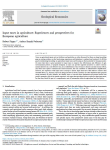Finger R., Pedersen A.B. (2025). Input taxes in agriculture: experiences and perspectives for European agriculture. Ecological Economics, 01/07/2025, vol. 233, p. 108575.
https://doi.org/10.1016/j.ecolecon.2025.108575
https://doi.org/10.1016/j.ecolecon.2025.108575
| Titre : | Input taxes in agriculture: experiences and perspectives for European agriculture (2025) |
| Auteurs : | R. Finger ; A.B. Pedersen |
| Type de document : | Article |
| Dans : | Ecological Economics (vol. 233, July 2025) |
| Article en page(s) : | p. 108575 |
| Langues : | Anglais |
| Langues du résumé : | Anglais |
| Catégories : |
Catégories principales 06 - AGRICULTURE. FORÊTS. PÊCHES ; 6.6 - Technique Agricole (sols, engrais, mécanisation)Thésaurus IAMM MOYEN DE PRODUCTION AGRICOLE ; PESTICIDE ; AZOTE ; IMPOT ; SYSTEME DE PRODUCTION ; EUROPE |
| Résumé : | Taxes on agricultural inputs such as fertilizers and pesticides are often discussed, but there are large knowledge gaps as existing evidence on the functioning, experiences and limitations is outdated and scattered. We fill this gap by synthesizing knowledge on agricultural input taxes and focusing on their potential for European policy. We show that there is great potential for input taxes to improve the effectiveness and efficiency of agri-environmental policies. If properly designed, (i) taxes can provide targeted incentives to achieve environmental objectives in a cost-effective way, (ii) a redistribution of tax revenues to farmers can limit income effects, (iii) when taxes replace command and control measures, this can contribute to administrative simplification. However, the experience with input taxes in Europe is mixed. Input taxes have often failed to achieve their intended effects, e.g. because of poor tax design and low tax levels, and there are other limitations that generate strong resistance in policy debates. We identify ways to overcome these limitations and present lessons from positive examples, such as the Danish experience. We argue that agricultural policy needs more than input taxes, but that they should be part of a comprehensive mix of instruments within an agricultural and food policy. |
| Cote : | Réservé lecteur CIHEAM |
| URL / DOI : | https://doi.org/10.1016/j.ecolecon.2025.108575 |







